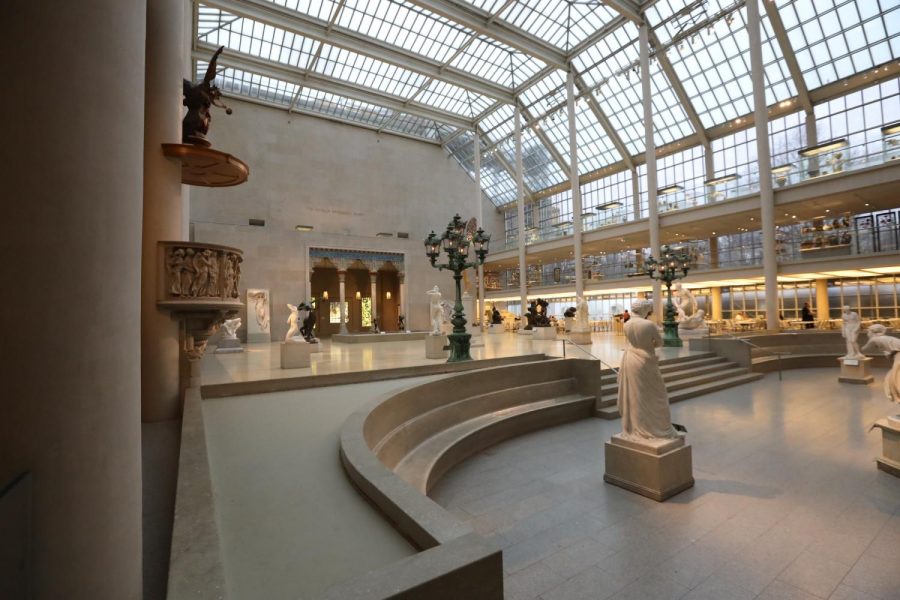NYU’s Museum Gateway program, which offers free museum admission for students, has remained suspended since last fall due to administration’s COVID-related concerns. The student body’s response has been, at least anecdotally, negative. Given that New York State categorizes museums as low-risk, students raised complaints about NYU’s raised tuition amidst reduced accessibility to city experiences, like museums, that can be otherwise financially unobtainable. Yet, this forced inaccessibility gives us a unique opportunity to re-evaluate our relationships with museums like the Guggenheim and MoMA.
Many museums act as direct material manifestations of colonization through the high proportions of displayed artifacts being looted. 90-95 percent of sub-Saharan cultural artifacts have been transported away from Africa to major museums across Europe and North America. A prominent example is the Benin Bronzes, a collection of at least 3,000 artifacts. As British military burned down Benin City to the ground, the looted artifacts were displaced to Western institutions like the British Museum in London, the Metropolitan Museum of Art in New York and the Ethnological Museum of Berlin. Despite calls for repatriation, institutions globally have refused or stalled.
Beyond exhibitions, museums are complicit in exploitation. Recently, MoMA’s chairman Leon Black made headlines after stepping down from re-election over protests against his $158 million contribution to convicted pedophile Jeffrey Epstein. However, this individual resignation does not come close to capturing the full scope of how institutions like MoMA endorse oppressive political power structures. Another currently active executive figure, trustee Larry Fink, is a driving financier of private prisons, the NYPD and the destruction of the Amazon rainforest. By allowing Fink to maintain administrative powers at MoMA despite outcry by hundreds of art professionals over Fink’s refusal to divest, MoMA enables his oppressive behavior and refuses accountability.
Other museums to which NYU’s Museum Gateway has previously offered student admission, like the Whitney or the Guggenheim, are just as complicit. Until just two years ago, the Whitney’s vice-chairman Warren Kanders owned a weapon and teargas manufacturer on the US-Mexico border. Even this summer, the Whitney failed to deliver on its reform promises of reducing the gap in compensation for marginalized Black artists. Similarly, the Guggenheim has been called out for its systemic racism and complacency in the documented exploitation of migrant laborers at its Abu Dhabi building site.
Amidst the rising public reckoning, art museums are facing nationwide over their roles in colonialism and political oppression, the NYU community — which is so intrinsically connected to the city and its spaces — should critically analyze our beloved artistic institutions and the relationships we hold with them.
Of course, there is no denying the positives that free admission to museums can offer in providing accessible spaces of creativity and community. Our obligation, then, should be to more deeply consider questions, themes and structures when experiencing conflicted spaces like museums.
Who do these institutions exist to serve, and why were these artworks curated in this specific style? Are there other ways to support artists and communities that are less complicit in colonialism? While it is difficult to determine if any institution can be fully free from perpetuating oppression, spaces like the Laundromat Project (a laundromat repurposed as an artistic hub for community change) and the Studio Museum in Harlem (a gallery displaying work influenced by Black culture or created by African artists) serve as valuable alternatives.
Given the complicated nature of defining our connections to such institutions, when the Gateway Program does re-open, we as a student body should be offered the opportunity to provide rolling input on which spaces we desire NYU to support through their contracted free admission. By offering this space for student engagement in our school’s endorsements, we will, at the very least, move a little closer to re-working our perspectives on art, museums and our relationships to them.
Opinions expressed on the editorial pages are not necessarily those of WSN, and our publication of opinions is not an endorsement of them.
Email Michelle Han at [email protected].


























































































































































